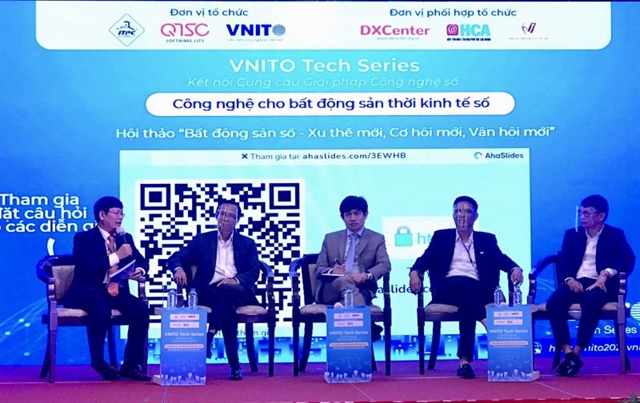The COVID-19 pandemic has prompted developers of commercial buildings, apartments and residential areas to embrace digital transformation and adopt digital technologies in their projects, a conference heard in HCM City on December 16.

A panel discuss at the VNITO Tech Series conference held in HCM City on December 16. — Photo courtesy of the organisers
The COVID-19 pandemic has prompted developers of commercial buildings, apartments and residential areas to embrace digital transformation and adopt digital technologies in their projects, a conference heard in HCM City on Wednesday.
Speaking at the Vietnam IT Outsourcing (VNITO) Tech Series on ‘Real estate technology in the digital economy,’ Cao Thi Phi Van, deputy director of the Investment and Trade Promotion Centre of HCM City (ITPC), said the fourth industrial revolution and pandemic forced digital transformation upon all industries everywhere, and Viet Nam is no exception.
The country’s advantages such as a young and tech-savvy population, 64 million internet users, and embrace of information technology in all fields were powerful factors in fostering digital transformation, she said.
Speakers said terms such as digital assets, proptech and digital real estate were becoming increasingly popular around the world.
In Viet Nam, promoting digital transformation in the property sector would help reduce transaction and management costs, increase market, information and data access and enhance connectivity, they said.
Digital transformation opens up new services and business opportunities, and increases the property sector’s ability to participate in domestic and international value chains, according to the experts.
The VNITO Tech Series brought to real estate firms and investors new breakthroughs and new concepts in the sector, Pham Thi Kim Phuong, deputy director of Quang Trung Software City (QTSC) and director of the Digital Transformation Consulting and Support Centre of HCM City, said.
Tran Phuc Hong, VNITO deputy chairman, said COVID-19 did create new challenges related to safety and security control at buildings, offices and residential areas, but also helped accelerate adoption of technologies to solve them.
Nguyen Duy Thanh, chairman of Global Home Company and founding member of the HCM City Real Estate Club, said digital technologies were imperative in the property sector.
Building managements faced difficulties in ensuring epidemic control, complying with 5K regulations, social distancing, and supplying food to residents, he said.
This was a driving force for developers management units to adopt digital technology and speed up digital transformation, he said.
Hong said, “Vietnamese technology companies have invested in many products and solutions for … the real estate sector, and these can compete with those made by foreign firms.
“Digital real estate will be an investment trend in the coming years.”
Within the framework of the conference, technology companies showcased a wide range of solutions for smart buildings and residential areas, digital real estate, construction technologies, and others.
Organised by the ITPC, QTSC and VNITO Alliance, the conference attracted leading firms in the IT and real estate sectors. — VNS





